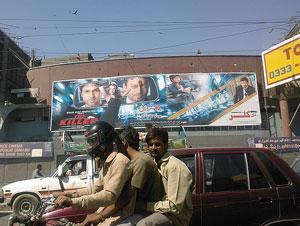Pakistan’s faltering film industry
Cinema in Karachi, Pakistan (Image CC: Shoa / Flickr)
For those living through tough, sometimes treacherous times, in Pakistan there’s precious little relief. Pakistani movies used to provide that. Homegrown cinema once thrived. Now it’s struggling to survive. The World’s Laura Lynch reports.
Mohammed Nazir is unwinding a piece of Pakistan’s cultural history. Nazir is the projectionist at the Capri cinema. Both the room and the equipment look as though they’re part of a museum. Then again, the film he’s unspooling today is also pretty old.
Nazir has worked here less than a year. He says the old projectionist left because there just wasn’t enough work. The Pakistani film industry today is a faded version of its former vibrant self. Pakistan used to boast close to the two thousand theaters. Today, there are fewer than 200. Many are like this one, decaying and decrepit. Former film star Faisal Rehman lived through the highs and lows as a silver screen heart throb.
"Yes, I did movies for about 15 years of my life and then I saw that doing the films were declining and television was coming up and there’s more money in television. So, you know, I just switched to television."
Lahore used to be the passionately beating heart of Pakistani film making. Hence the nickname "Lollywood." But today inside video and DVD stores like this one, customers are more likely to snap up not exactly legal copies of Bollywood films from India. That’s despite a ban on Indian films that’s part political, part protectionist. Omar Adil has studied the Pakistani industry for years.
"Until the 60s, Pakistani cinema was on an up and up journey. It actually reached its zenith by the mid 60s. At least 25% went on to become spectacular box office hits. So it was sustaining itself. By the same time, a very big diversion came into each household, and that was television."
Television certainly hurt but government didn’t help, pouring money into state TV at the expense of film makers. Then in the late 1970s, Zia Al Haq seized power in a military coup, and began a campaign of Islamicization. Movies, says Adil, suddenly had to fit a mold.
"So, yes, Zia Al Haq and what his policies were, were not there to crush cinema but were actually there to transform all forms of entertainment and media so that they actually fitted his description of an Islamic country. And that vision was distorted. That vision was far from reality."
But the new reality led most high-brow movie makers to leave the business, and some, the country. Those who stayed adapted. With government censoring displays of affection, formulaic, violent films took over most screens. Adil, who subsidizes his avocation for studying the film industry by working as an orthopedic surgeon says the prognosis isn’t good.
"Cinema is in the intensive care at the moment. It is not yet dead but it is on a life aid. I’m sorry that I’m actually now relating it to something I do as a profession, but if you have a critically ill patient there has to be a multi-disciplinary team looking at the revival or the resuscitation of that particular patient. Cinema needs that."
Inside the Capri a dozen men are scattered in seats around the theater as the matinee gets underway. Within minutes less than special effects are on display, as crude images show a woman transformed into a wolf, fangs bared. This isn’t what most Pakistanis consider to be a reflection of their culture or their country, says former film star Faisal Rehman. Then again, he says it’s a symptom of a much larger problem for a fragile country fractured by politics and religion.
As the closing credits roll over a final dance sequence, the sparse audience shuffles out of the Capri. The theater might get a few more customers later tonight, but just a few more. Without help, Pakistan’s film makers may well be into their final act.
PRI’s "The World" is a one-hour, weekday radio news magazine offering a mix of news, features, interviews, and music from around the globe. "The World" is a co-production of the BBC World Service, PRI and WGBH Boston.
We want to hear your feedback so we can keep improving our website, theworld.org. Please fill out this quick survey and let us know your thoughts (your answers will be anonymous). Thanks for your time!
